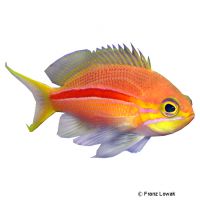Redstripe Anthias (Pseudanthias fasciatus)
| Redstripe Anthias Pseudanthias fasciatus | |
|---|---|
| Name | Redstripe Anthias |
| Name Lat. | Pseudanthias fasciatus |
| Family | Sea Basses |
| Family lat. | Serranidae |
| Order | Perch-likes |
| Order lat. | Perciformes |
| Origin | Indo-West Pacific, Red Sea |
| Habitat | Seaward reefs |
| Diet | Planktivore |
| pH | 8.1-8.4 |
| Hardness | 8-10 °KH |
| Behavior | Peaceful |
| Keeping | Harem |
| Reef Compatible | Yes |
| Care Level | Moderate |
| Life Span | N/A |
| Protection | No |
| Metric Units | |
| Size | 15-20 cm |
| Temperature | 22-28 °C |
| Salinity | 33-36 ‰ |
| Aquarium | ~ 600 l |
| US Units | |
| Size | 6"-8" |
| Temperature | 72-82 °F |
| Salinity | 1.020-1.025 sg |
| Aquarium | ~ 150 gal |
Distribution and habitat
The range of Pseudanthias fasciatus is the tropical Indo-West Pacific, from the Red Sea to the Great Barrier Reef and southern Japan. They prefer to live in small groups on slopes of outer reefs with numerous caves and crevices and strong currents.
Maintenance
They require a well-structured aquarium with a reef structure (many crevices and caves) and with live stones that act like a biological filter, as well as plenty of swimming space with a steady current. Only lime-rich, heavy metal-free sands, gravels, stones or sea sand of various grain sizes may be used as substrate
Filters, skimmers and heaters are necessary to ensure water quality, as well as pumps to simulate tides, swells and bottom currents. Lighting must correspond to the species-appropriate day-night rhythm of the animals
| Salinity: 33-36 ‰ | pH value: 8.1-8.4 |
| Carbonate hardness: 8-10 °KH | Nitrate content: 2-8 mg/l |
| phosphate content: 0.01-0.1 mg/l | nitrite content: 0.0-0.05 mg/l |
For salinity, an average value should be aimed for, which may only vary slightly by +/- 0.5 ‰. Ammonia and ammonium must not be measurable. Special attention must be paid to consistently good water quality and water values.
Diet
They are permanent feeders, feeding mainly on zooplankton and suspended algae. The food change does not always succeed without problems. The food supply should consist of a combination of live and frozen food, such as small mysis, krill, fish roe, lobster eggs, artemia, cyclops and bosmids, or a commercially available frozen special food mixture enriched with vitamins for plankton eaters. Dry food (granules, flakes) is rarely accepted
It is recommended to feed small portions several times a day (5-8 times). Regular and varied feeding promotes health and increases resistance.
Behaviour and compatibility
They should be maintained as a harem, one male with several females, or in a group. To avoid ranking fights, they should be introduced into the aquarium at the same time. They have a highly specialized social behavior, skirmishes with short chases are normal (hiding places). Care should be taken when socializing with surgeonfish and red colored wrasses are often not tolerated. They usually behave peacefully towards other fish.
Sex dimorphism
They are protogynous hermaphrodites, meaning males develop from functional females when needed. Males are more intensely purple in color, females are more lavender with a yellow dorsal and caudal fin.
Reproduction and breeding
There are no known reports of successful breeding in the aquarium.
Important
For these fish living at greater depths, the aquarium lighting should be somewhat shaded. In case of danger they disappear in a flash into coral and rock crevices
A dim night light is advantageous, as the animals tend to jump out of the aquarium in complete darkness. They are typical coral reef inhabitants and should not be kept in a fish-only aquarium
If different species are kept together, care should be taken to ensure that the fish match each other in terms of water quality and temperature requirements and social behavior, and that the setup meets the needs of all species kept together. New fish to be introduced must be acclimated slowly to the water in the aquarium
Further literature can be found in your pet store.
References
Text: petdata; Image: Franz Lowak
Source: 2. Tierhaltungsverordnung BGBl. Nr. 486/2004 idgF; KNOP (2013): Lexikon der Meeresaquaristik, Natur und Tier Verlag; ENGELMANN (2005): Zootierhaltung - Tiere in menschlicher Obhut: Fische, Verlag Harri Deutsch
- Gemäß § 21 Abs. 5 Tierschutzgesetz idgF
